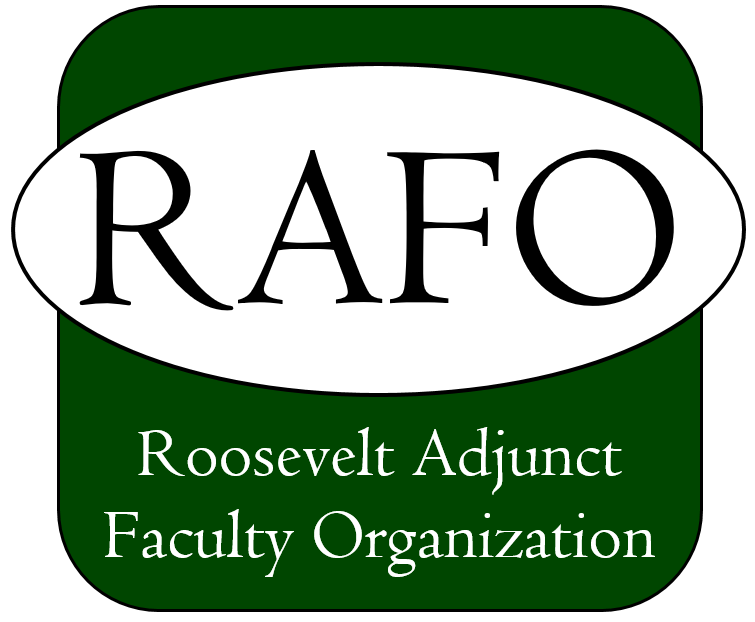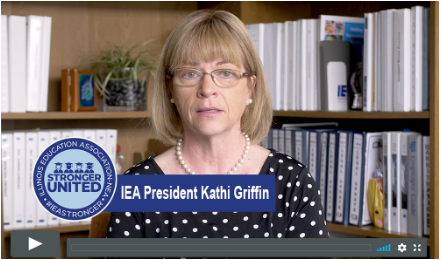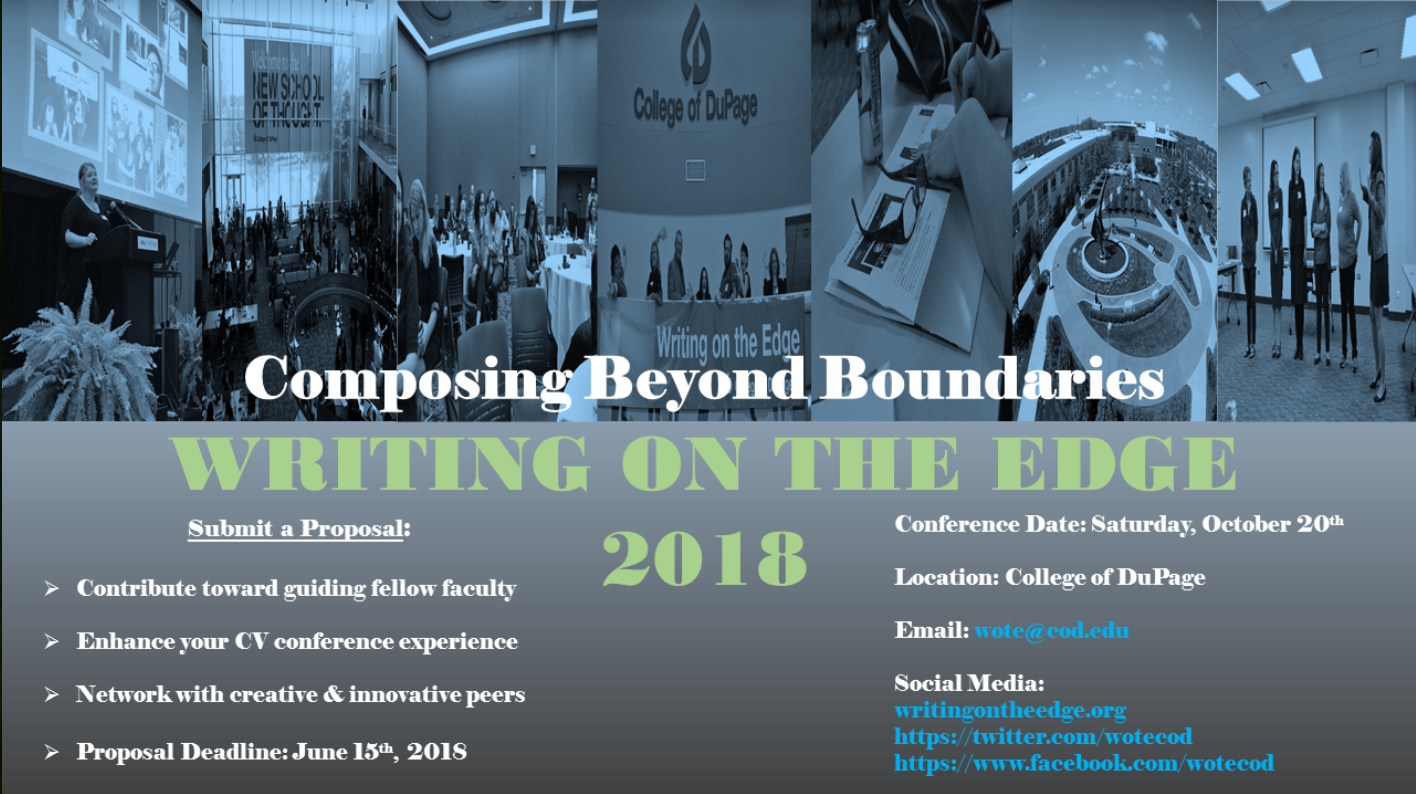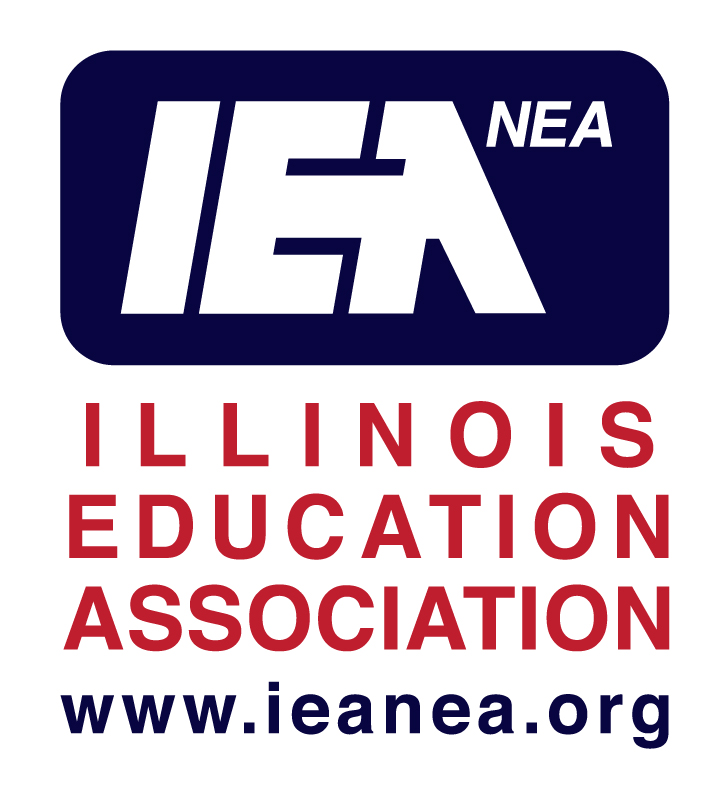Last week in the case of Janus vs. AFSCME, the Supreme Court overturned a 40-year decision in a 5-4 decision siding with plaintiff Mark Janus stating that non-union or “fair share” members are no longer required to pay their union dues. Public unions across America will face the repercussions of this decision with both discouragement and opportunity. The opportunities return to an original model of unionism at its inception. Building relationships with those who stand up for their labor rights and ensure the fair practices within the work place.
Because Roosevelt University is a private institution, RAFO and its bargaining are not directly affected by the Supreme Court Janus decision. The fee payer structure will remain in place. However, we are committed to strengthening our bargaining unit, supporting workers’ rights and representing our members’ concerns and questions to the administration. The method of achieving these goals brings more adjunct faculty into the fold of full bargaining unit member status.
RAFO remains dedicated to a culture of listening. We want to seek and hear the ideas and suggestions from our members prior to bringing them to the administration. If you are concerned about IEA funding elections for specific candidates and campaigns, step up and serve on the Region 67 committee that makes those decisions. If you have questions about the university’s financial state in consideration of the recent bond downgrades, reach out to us and fill one of the open governance positions in Senate or College Council. If you want a voice in changing the current RAFO contract, prepare to serve on the next negotiating team. Or simply attend one of the Zoom Q&A video conferences we plan to hold monthly over the next academic year (dates and times TBA).
Strong unions begin with relationships – not political agendas. We are listening.
We won’t give up advocating for our students
In a narrow decision, the U.S. Supreme Court today turned its back on the educators, nurses, firefighters, police officers, and public servants who make our communities strong and safe.
In Janus v. AFSCME, the court overturned common sense jurisprudence that was established more than 40 years ago. By overturning Abood, the court ruled non-members no longer have to pay fair share fees, but unions are still required by law to represent them. Allowing some to opt out of paying will make it harder for all public employees to provide the services that everyone depends on; it will be harder for our educators to advocate for our students and public education; and it will be harder for workers to join together in strong unions.
The key word here is harder, not impossible.
It has never been more vital that those of us who believe in fair contracts use our collective voice to make sure that all students have access to a high-quality public education. We will continue to spread the truth about the importance of union membership to all of our brothers and sisters working in schools.
We are aware that the Illinois Policy Institute is currently making plans for at least one campaign to try to get IEA members in fair share locals to cancel their membership. This campaign will likely try to convince you – by a letter sent to your home -- that you can save your dues dollars each year by simply sending one pre-paid mailing to your school district to tell them to stop your payroll deduction and a second to your local to cancel your membership. The Policy Institute wants to make it very easy for you to do this because they know that fewer members in your local association means less power at the bargaining table – and that’s their goal. If you’re wondering, here’s a list of other things you would also lose if you cancel your membership.
But this won’t be the last you hear from the Policy Institute, or other entities, trying to get you to drop your membership. Their goal is to take power away from educators and our students.
This fight is just beginning. We won’t let them stop us. We will use their attacks to build a stronger IEA and we will move forward together because we know we are STRONGER UNITED.
In solidarity,
Kathi Griffin,
IEA President
There's still time to apply! The proposal deadline has been extended to July 5!
Writing on the Edge is back and bigger and better than ever! Our fourth annual Writing on the Edge Conference is set for Saturday, October 20th, at College of DuPage. This year, we are opening up the conference to any faculty that uses writing in their classes. We are very interested in how writing is used across the curriculum and invite you to come experience the only writing conference put on by and for adjuncts and contingent faculty in the Midwest. We have it competitively priced at only $35 for a whole day of professional development. We will have a keynote speaker on writing across the curriculum, and breakout sessions given by fellow instructors.
We are looking for interactive proposals that show how you use writing in the classroom and beyond and the particular insights, advantages, and disadvantages of being an adjunct. The call for proposals is below and also attached. Please consider putting in a proposal this year, and also sending this on to anyone you think would benefit from this conference. Preference will be given to adjunct and contingent faculty, but full time faculty can submit proposals, too!
Proposals are due by Friday, June 15th. Hope to hear from you soon!
The Writing on the Edge (WOTE) Committee
College of DuPage
425 N Fawell Blvd
Glen Ellyn, IL 60137
www.writingontheedge.org
From Vaida Miseviciute, ELP Adjunct Faculty
April 24, 2018

It is no surprise that millennials learn and see the world differently. Whether we like it or not, technology has influenced the way they search for information, apply it, and learn it. As a digital immigrant, I do believe that meaningful learning can happen without technology; however, I was inspired by the creative use of technology in language teaching and by the research-based results on how technology can enhance the experience.
Specifically, I really want to share one of the findings from the conference about feedback we give to students. There is a significant amount of data that audio feedback is more effective than written feedback. When I sent audio feedback to some of my students about their papers, I felt like I just had a drink form the Fountain of Youth. I was once again a “COOL” professor who understood their way. Even though I did not say anything different in my audio comments, the way the words came alive to them was very obvious. While a simple strategy, I would have never thought of it without the opportunity to participate in the conference. Thanks again to RAFO for helping us all to be more professional and inspired in our teaching.
We are happy to announce the results of our recent election of executive board members:
- President: Jennifer Wilson
- Vice President: (open)
- Treasurer: Don Wlodarski
- Grievance Chair: Bonnie Smothers
- Member Chair: Joseph Fedorko
Here are the results from our governance election:
College of Arts & Sciences
- Senate: Bonnie Smothers
- College Council: Mike Tafel
College of Education
- Senate: Ameila Hicks
- College Council: Ameila Hicks
Heller College of Business
- Senate: Cindy Eisenhard & Donald Wlodarski
- College Council: Steve Fedota
Subcategories
Contracts
RAFO Members:
As lead negotiator for the 2020-2024 contract, I am pleased to announce that your negotiating team and Roosevelt University have come to an agreement. RAFO is extremely pleased with the final outcome and we believe you will be, too. The University was adamant on 0% for the first year, but as an offset for that 0%, we negotiated a signing bonus of $150 for each bargaining unit member that taught either in Spring 2020 or will teach in the upcoming Fall 2020 semester. That then takes us into the final three years of the contract where adjuncts will receive a 2% increase for each of those years.
As I hope you can see from the above, RAFO worked hard to ensure that you are rewarded for the professionalism and integrity all have shown during these unusual and trying times. We are attaching a copy of the final contract for you to review and eventually ratify. The areas that appear in green are changes that were made to the verbiage in the contract that will support RAFO during the upcoming 4 years. Appendix A reflects the 2% increase for each step in the final three years.
A link with the time will be sent next week for all to join this a zoom meeting, where we can answer your questions about the contract.
In closing, we hope you will be as excited as we are regarding the new contract.
In solidarity,
Don Wlodarski and the RAFO team:
Jen Wilson, Joseph Fedorko, Amelia Hicks, Stan Traywick, Mike Pinsoff and Dennis Tucker
Page 26 of 32



